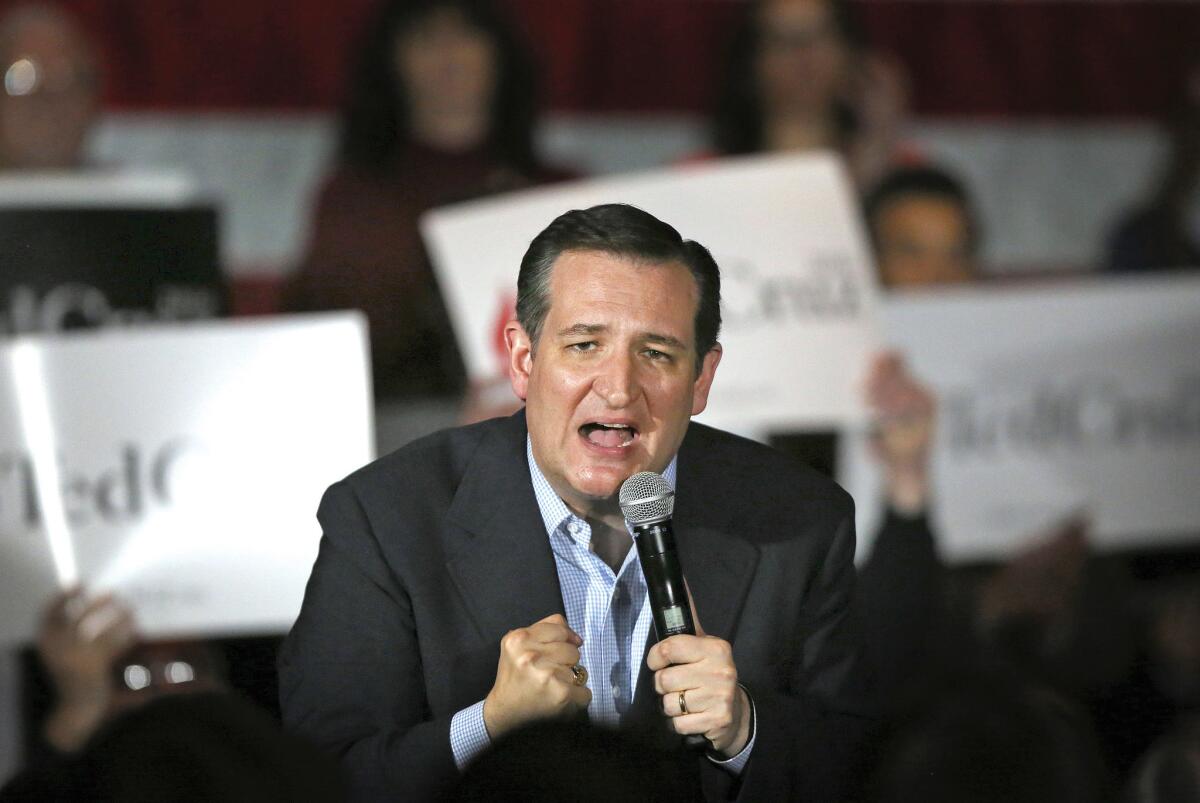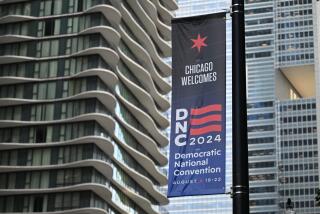Op-Ed: The presidential primaries are out of control — and the party conventions are broken

Republican Presidential candidate Ted Cruz makes a stop at the Armory restaurant in downtown Janesville, Wis. on March 24.
Despite Donald Trump’s recent primary victories, Republicans may yet be headed toward a brokered party convention this summer in Cleveland. In an earlier era, that would have been business as usual. Today, it’s considered a crisis.
Americans cling to the notion that “the people” alone can and must choose their own leaders. By that logic, direct election through primaries is the only legitimate way to pick presidential candidates. (Delegates deliberating at a party convention are seen as fundamentally undemocratic.) When things go smoothly, this notion flatters our self-importance. But when the voice of the people is garbled and no majority emerges, as may happen this year, we are left with no legitimate way forward.
In the early years of the American republic, presidential candidates were selected by fellow politicians. But the professionals got sidelined over time by successive waves of reform. Legislative caucuses were supplanted by national conventions in the early 19th century. Then at the turn of the 20th century some states began to bind convention delegates based on the outcomes of state primaries. But politicians and party leaders still held significant sway — until 1968.
Exclusive reliance on popular votes to select our candidates isn’t just a harmless bit of idealism. There’s reason to worry that it has saddled us with less capable presidents.
That year, delegates at the Democratic convention nominated Hubert Humphrey, who had not even run in the presidential primaries. Disgruntled young Democrats and police clashed violently in the streets of Chicago and Humphrey went down to defeat in November. Afterward both parties reformed their nominating processes, replacing the remaining state conventions (and most caucuses) with additional primary elections. A Democratic Party reform commission declared that “popular control of the Democratic Party is necessary for its survival.”
Americans’ enthusiasm for greater popular control as the solution to every political problem reflects their faith in what we call the “folk theory” of democracy: the notion that ordinary citizens can, somehow, steer the ship of state from the voting booth. Scientific evidence and political experience suggest this faith is misplaced. The verdict of ordinary citizens in a presidential election is essentially random — not quite a coin flip, but strongly influenced by idiosyncratic factors such as whether the economy was growing in the months before Election Day. Why, then, would primaries and caucuses spread over five months and involving a dozen candidates be expected to arrive at a clear choice, much less a wise one?
When party delegates were prominent political figures in their own right, selected as a significant matter of party business, their deliberations at a convention had substantial legitimacy. Perhaps not enough to justify nominating Humphrey, but enough to credibly swing the nomination to a contender who fell short of a popular majority. Not so today. Deliberation has fallen out of public favor.
As a result, delegate selection has become an arcane, largely invisible process that, in most election cycles, decides nothing more important than who will get a trip to the convention to cast a symbolic vote for the winner of a state’s primary. A candidate sufficiently organized to manipulate the complex state-specific rules for selecting delegates (read: Ted Cruz) might be able to prevail in a brokered convention. But it would most certainly infuriate the party rank-and-file.
Ironically, given the Democratic Party’s stated commitment to popular control, its nomination rules retain a layer of professional oversight. Having been stung by the improbable nominations of outsiders George McGovern and Jimmy Carter, Democrats since the 1980s have reserved a block of votes at their convention for superdelegates — top party leaders and elected officials who can choose whom to support. This year, about 15% of the delegates at the Democratic convention will be superdelegates, and they tilt sharply toward Hillary Clinton.
That too is causing grousing among those in the thrall of the folk theory. Bernie Sanders supporters call superdelegates at home urging them to respect the will of the people. Political commentators charge that it is outrageous and thoroughly undemocratic to give so much power to party elites. Yet is it really so far-fetched that professional politicians — many of whom know Clinton and Sanders, and whose careers hinge on the party’s performance in November — might have valuable opinions about the candidates’ aptitude for the presidency?
Exclusive reliance on popular votes to select our candidates isn’t just a harmless bit of idealism. There’s reason to worry that it has saddled us with less capable presidents. As rated by historians, the average quality of presidents has been distinctly lower in the 40 years since the party reforms of the early 1970s than in the 40 years before. By this rough test at least, the folk theory of democracy has entailed real costs.
American government is founded on checks and balances. But our unchecked enthusiasm for voting in primaries, with no balancing counterweight of considered deliberation by professionals, bears considerable blame for the GOP’s potential debacle in Cleveland.
Christopher H. Achen and Larry M. Bartels are political scientists at Princeton University and Vanderbilt University, respectively, and the authors of “Democracy for Realists: Why Elections Do Not Produce Responsive Government.”
Follow the Opinion section on Twitter @latimesopinion and Facebook
More to Read
A cure for the common opinion
Get thought-provoking perspectives with our weekly newsletter.
You may occasionally receive promotional content from the Los Angeles Times.










